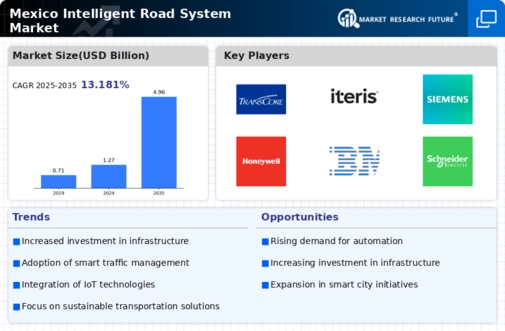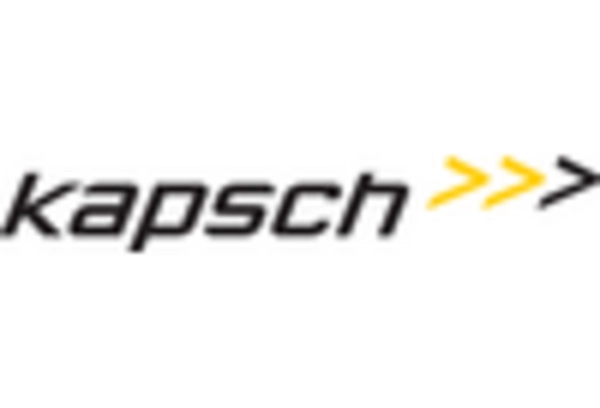Increased Focus on Road Safety
Road safety remains a critical concern in Mexico, with traffic accidents resulting in significant fatalities and injuries each year. The intelligent road-system market is poised to benefit from the heightened focus on improving road safety through advanced technologies. Initiatives aimed at reducing accidents, such as the installation of smart traffic signals and surveillance systems, are gaining traction. In 2025, it is estimated that investments in road safety technologies will exceed $200 million, reflecting a commitment to creating safer road environments. By leveraging data analytics and real-time monitoring, intelligent road-systems can enhance situational awareness for drivers and authorities, ultimately contributing to a decline in road-related incidents.
Government Initiatives for Smart Mobility
The Mexican government actively promotes the development of intelligent road-systems through various initiatives aimed at enhancing urban mobility. These initiatives include funding for smart infrastructure projects and the implementation of policies that encourage the adoption of advanced technologies in transportation. In 2025, the government allocated approximately $500 million to improve road safety and efficiency, which is expected to significantly impact the intelligent road-system market. By fostering public-private partnerships, the government aims to create a more integrated transportation network that leverages data analytics and real-time monitoring. This focus on smart mobility not only addresses traffic congestion but also enhances the overall user experience, thereby driving growth in the intelligent road-system market.
Rising Urbanization and Population Growth
Mexico is experiencing rapid urbanization, with over 80% of its population now residing in urban areas. This demographic shift places immense pressure on existing transportation infrastructure, necessitating the adoption of intelligent road-systems to manage traffic flow and enhance safety. The intelligent road-system market is projected to grow as cities implement smart traffic management solutions to accommodate the increasing number of vehicles. By 2025, urban areas are expected to see a 15% rise in vehicle ownership, further underscoring the need for innovative solutions. Intelligent road-systems can provide real-time data to optimize traffic signals and reduce congestion, making them essential for urban planners and policymakers in Mexico.
Technological Advancements in Transportation
The intelligent road-system market is significantly influenced by rapid technological advancements in transportation. Innovations such as vehicle-to-everything (V2X) communication, artificial intelligence, and machine learning are transforming how traffic systems operate. In Mexico, the integration of these technologies is expected to enhance road safety and efficiency. For instance, the implementation of AI-driven traffic management systems can lead to a reduction in traffic accidents by up to 30%. As these technologies become more accessible and affordable, their adoption is likely to accelerate, driving growth in the intelligent road-system market. The continuous evolution of technology presents opportunities for stakeholders to invest in smarter, more efficient transportation solutions.
Environmental Concerns and Sustainability Goals
Growing environmental concerns in Mexico are prompting a shift towards sustainable transportation solutions, which directly impacts the intelligent road-system market. The government has set ambitious targets to reduce greenhouse gas emissions by 30% by 2030, leading to increased investments in eco-friendly infrastructure. Intelligent road-systems play a crucial role in achieving these sustainability goals by optimizing traffic flow and reducing fuel consumption. The integration of smart technologies can lead to a decrease in emissions from vehicles, aligning with Mexico's commitment to environmental sustainability. As public awareness of climate change rises, the demand for intelligent road-systems that support green initiatives is likely to grow, further propelling market expansion.
















